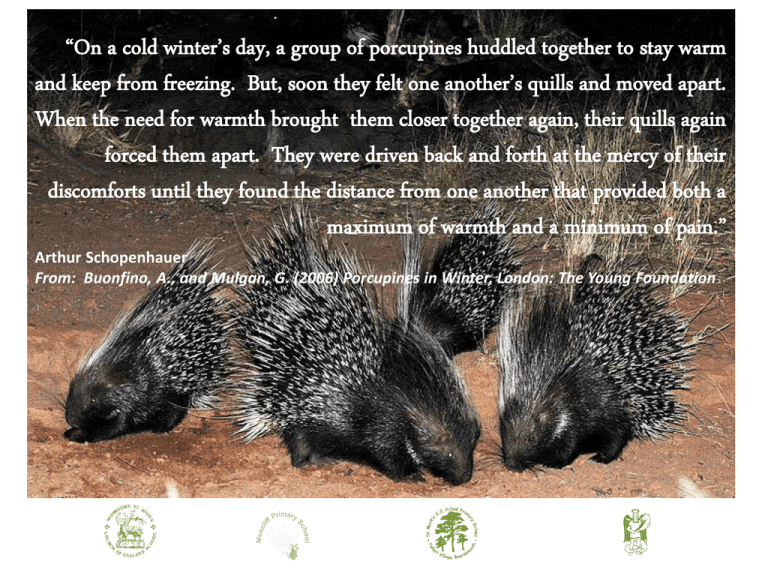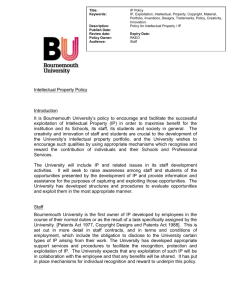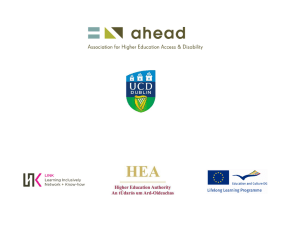Bournemouth Septenary Trust PowerPoint
advertisement

“On a cold winter’s day, a group of porcupines huddled together to stay warm and keep from freezing. But, soon they felt one another’s quills and moved apart. When the need for warmth brought them closer together again, their quills again forced them apart. They were driven back and forth at the mercy of their discomforts until they found the distance from one another that provided both a maximum of warmth and a minimum of pain.” Arthur Schopenhauer From: Buonfino, A., and Mulgan, G. (2006) Porcupines in Winter, London: The Young Foundation Caroline Burn • Headteacher St. Mark’s CE VA Primary, Talbot Village, Bournemouth • Large primary – 420 pupils • Only school in Bournemouth in the Salisbury Diocese, ‘honorary’ member of Winchester Diocese Our Network Story Founded in 2005 with a primary Strategy Learning Grant For the purpose of… SCHOOL IMPROVEMENT 2008 2007 2006 High Quality joint INSET TRAINING DAYS for Teachers and Teaching Assistants HELPING PUPILS REACH THEIR POTENTIAL IN MATHS Mike Askew Janet Rees King’s College, London Independent Consultant in EY & SEN PROBLEM SOLVING IN MATHS… The Next Steps Ruth Merrtens Education Director, Hamilton Trust Les Ruddick & Sue Wickings Bournemouth LEA INSPIRE… CHALLENGE… MOTIVATE… Towards a Futures Curriculum Nick Hinds, Independent Consultant 2010 2009 High Quality INSET TRAINING DAYS for Teachers and Teaching Assistants DEVELOPING THE WHOLE CHILD THROUGH THE FUTURES CURRICULUM Peter Sharp - Director of learning, Mouchel Jenny Mosely workshop Colour Works Rights Respecting Schools Bournemouth 2010 BI-CENTENARY Local artists and Xtreme Art 2013 2012 2011 High Quality INSET TRAINING DAYS for Teachers and Teaching Assistants LEARNERS FOR THE 21ST CENTURY Is there a place for child-led learning in primary education? Julie Fisher – Independent Early Years Adviser NO JOINT TRAINING DAY CURRENT SHARED FOCUS AREAS: Osiris Spelling, grammar & punctuation Osiris Y1 phonics screening Osiris Outstanding TAs Michele Cousins Guided learning & pupil independence Anne Crossland Good to outstanding teaching Judith O’Hare School self-evaluation High Quality Professional Development for Teachers and Teaching Assistants Staff meetings Moderation of writing levels Head Teacher Networking e.g. SEF APP training HT Training – John West-Burnham Twilights Lesson observations Networking for curriculum leaders and year group colleagues Heads – the driving force - JWB training • • • • Other things out there Co-operative Trust Federations Multi-Academy chains Where do we see the Network right now? Network Partnership Collaboration Federation Autonomy Integration Network Collaboration An informal voluntary association that is focused on a particular strategy or area of common interest. A more formal structured relationship in which there is a clear merging and integration of a number of school roles and functions, sharing of services and staff and collaboration on innovations or policy initiatives. The Local Authority Position The Writing’s on the wall!! In a year to 18 months things will have had to change! And have started to already, rapidly. Funding will come directly from the Government in future. Christine Gilbert ex-chief isnpector – ‘We’ll look at the role of Local Authorities and new models of collaboration that may supersede them.’ Life Beyond the Local Authority Status quo – LA dries up and we’re on our own. Become an Academy – discussed at own FGB meetings, but still an option. Autonomy on your own. Multi-academy Trusts/chains – no longer autonomous. Local Umbrella Trusts – for academies. Local Collaborative Trusts. Mutual Trading Companies. WHY Collaborate? Standards are likely to rise as the result of the dissemination of best practice across schools and between schools. There is the potential for economies of scale, notably in terms of learning resources, materials & services. Shared CPD has the potential to enhance consistent practice and embed improvement and cross-fertilise good ideas and the best practice. Why Collaborate? Strategic planning is more likely to be effective through collaborative leadership (More expertise – 4 SLTs). Intervention to support pupils would be more effective with consistent record keeping, monitoring and use of data. Deployment of staff could be more flexible and effective. The potential for successful collaboration with other agencies would be enhanced. (Robins D & West-Burnham J 2011 Leadership for Collaboration.) Status Quo Self-legitimating bureaucratic systems – silos. Self-referential culture, closed language. Parallel accountability. Competing professional identities. Competition for status and resources. The territorial imperative. LA push to do something They realised the writing was on the wall… Encouraged us to expand our group Rather ‘church’ based, needed more of a community feel We were all ‘good’ schools and some schools to support One school had previously left 26 primaries in Bournemouth to LCT’s We became seven! Structure of LCTs SCHOOL SCHOOL SCHOOL SCHOOL SCHOOL TRUST SCHOOL SCHOOL PARTNERS, such as university, Diocese, LA, secondary school, a local business The Legal Considerations Community schools to set up trusts LCT requires legally establishing and registering with the charities commission Seek legal help Membership of the Trust Board, in our case the HT and CoG of each school LCT board as policy maker LCTs and budgets Wise drafting of the Trust agreement Questions & Next Steps FGB agreement of each school Consult/discuss/inform stakeholders Agree time-scale and deadlines Working group with representation from each school Formal meeting with interested parties Schools, diocese, LA – this happened Agree ethos and vision Consider partnerships Vision Bournemouth Septenary Trust is committed to the core values of excellence, equity and effectiveness… promoting high levels of engagement, aspiration, achievement and enterprise across seven schools. Principles 1. 2. 3. The overriding principle is the success and wellbeing of the children educated within the Trust schools. There is an expectation of professional challenge, support and development between member schools. Trust between members is essential for the success of the collaboration. Principles 4. 5. Trust is engendered by: confidentiality, openness and professionalism. The HT and teacher standards provide a framework for this professionalism. The Trust members will take account of data protection policies in all work they do. Principles 6. The Trust members abide by the principles of best value and the long term benefit and gain of all the member schools. The budget will support the priorities based on the action plan. The Trust will not hold great sums of money but it will be spent to benefit the children in the schools at that time. Principles 7. Our work is focused on raising standards of provision in all areas of the Ofsted criteria and securing school improvements. Collaboratively we aim to respond quickly and effectively to new national priorities and local initiatives. Needs are identified across the Trust and responded to effectively both by the whole group and sub-groups. Documentation • Trust agreement – articles • Bye-laws, working principles (including a ‘get out’ clause) • Action plan Joint Art and Literacy Project – Degas – The beach scene 2 staff meetings and afternoon of a training day to plan Y4 example – Literacy and Art • Each HT led a year group team • Planned a theme, a ‘hook’, a literacy and an art focii, an outcome • Each year group spends as much/little time on this as they want Hook • 450 Y4 and adults to The Pier Theatre, Bournemouth Punch and Judy show • Performance • Literacy – writing scripts • Art/DT – making puppet theatres and puppets Outcome • The children congregate in 3 of our schools this week to perform to each other • An exhibition of all the work from the seven schools in the Bournemouth International Centre (BIC) next week, including filming of all the work What next? • • • • • • • • • Regular HT meetings Finance officers economy of scale SENCOs PE money – BST games Training days – Oct 25th (two key note speakers) and Feb 14th Subject leaders – the new curriculum All piece in newsletter British Council funded HT conference abroad School parent associations meeting to share ideas and equipment “On a cold winter’s day, a group of porcupines huddled together to stay warm and keep from freezing. But, soon they felt one another’s quills and moved apart. When the need for warmth brought them closer together again, their quills again forced them apart. They were driven back and forth at the mercy of their discomforts until they found the distance from one another that provided both a maximum of warmth and a minimum of pain.” Arthur Schopenhauer From: Buonfino, A., and Mulgan, G. (2006) Porcupines in Winter, London: The Young Foundation











